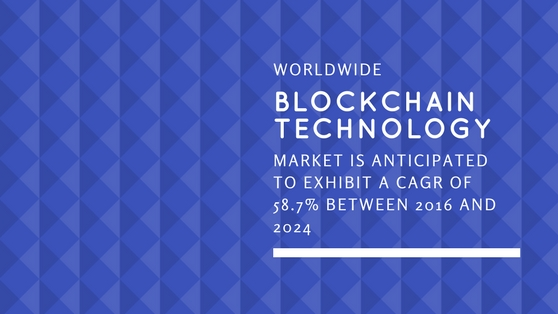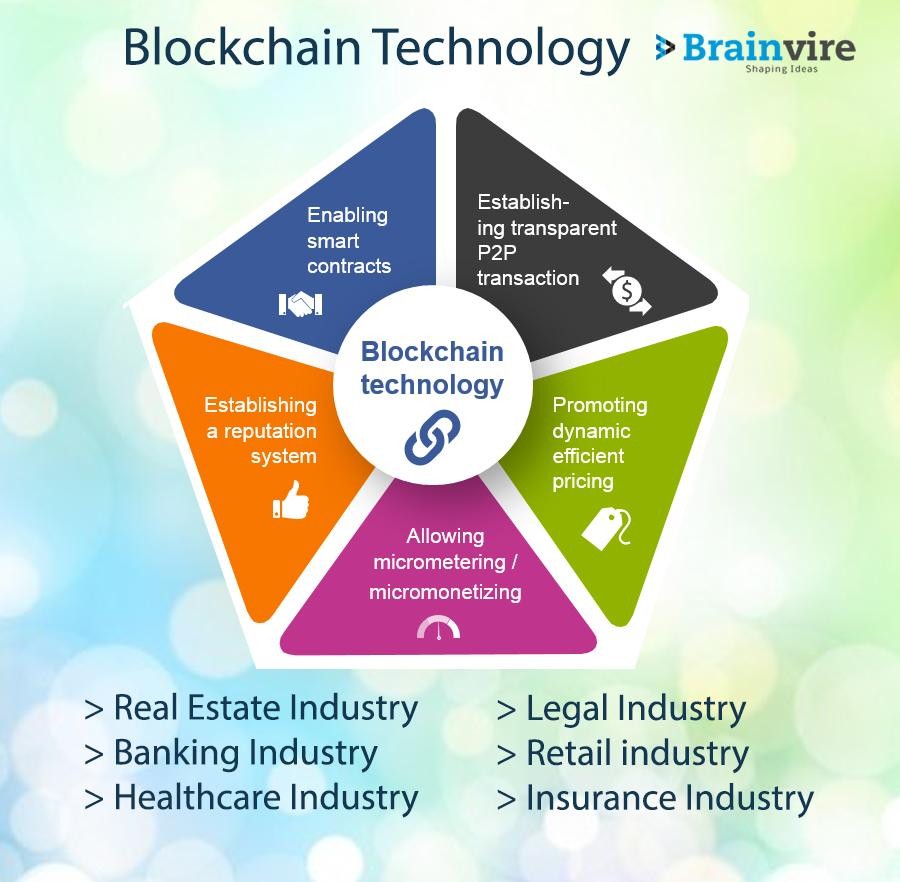Blockchain is a peer-to-peer distributed ledger system that grows on the list of records known as blocks. The blockchain technology has ground-breaking potential in securing the transactions across various computer systems. It uses cryptography solutions to make ledger tamper-proof. Blockchain is disrupting a wide range of industries with the help of its myriad applications.
According to research, 82%of the Fortune 100 have explored blockchain technology. The list includes some of the top-notch names such as SAP, IBM, Walmart, Samsung, Toyota Motors, and many more. Statista predicts that global spendings on the blockchain services will increase to $12.4 billion by 2022. Currently, the figure stands at $2.9 billion.
So, let’s take a peep into how blockchain has radically transformed the various industries.
Finance and Banking
The finance and banking industry has seen a massive digital transformation since the enhancement of blockchain technology. One of the visible changes is the digitalization of assets and the seamless transfer of different cryptocurrencies. Beyond any doubt, both blockchain and digital currency has been a big boost for the global economy. Statista reports that blockchain has created the biggest disruption in the financial sector with a 60.5% market share followed by others.
We can also explore a few more important statistics to see blockchain’s influence in the financial sector.
- About 90% of leading American and European banks are already using blockchain technology.
- Blockchain is helping the banks to reduce their infrastructure cost by 30%.
- The financial institutions can save up to $12 billion per year by implementing this futuristic technology.
- The global blockchain market revenue is expected to reach about $20 billion within the next 5 years.
There are various reasons why blockchain has been a huge hit in the finance sector. One of the key contributors has been the absence of any third-party application or no centralized authority for controlling the transaction. Secondly, participating nodes first cross-checks and verifies every transaction, which increases the trust that the process is safe and secure.
Blockchain helps in reducing the operational costs and brings more transparency to the settlement system. It offers an immutable ledger, which means the data cannot be altered or deleted. If anyone tries to change in the block, the other users will be able to view it. Moreover, availing loans and credits are much easier due to the removal of a middleman.
Healthcare
The healthcare industry has already started to reap the benefits of innovative technology with IoMT and mobile applications. The blockchain technology is assisting this sector to cater to various challenges. The hospital management often finds it difficult to manage huge medical data. It includes patient information, details about drug and medicine stock, and outdated methods of handling insurance and medical bills.
Blockchain technology is a one-stop solution to solve all the above-mentioned problems. It can combine with IoMT to propel a huge transformation. The patient medical data can be accessed in real-time, which helps doctors to make accurate decisions about the best course of treatment.
Next, the blockchain also encourages EHR (Electronic Health Records) interoperability with the help of APIs. It allows medical staff to store vital data in a reliable way. With robust security, hospitals can almost eliminate the cost of data reconciliation.
Blockchain has also streamlined the process of the insurance claim and payment of the medical bill.
Now let’s view a couple of statistics based on the industry.
- 40% of the healthcare institutions have added blockchain as their top business priority.
- The worldwide blockchain spending on healthcare sector will hit $5.61 billion by 2025.
- The implementation of blockchain technology will allow the healthcare industry to save $100 to $150 billion by 2025.
Real-Estate Sector
The big corporate houses and influential property dealers have so far dominated the real-estate business. However, with blockchain technology entering into the picture, we can expect digital transformation changing the traditional scenario. The decentralized ledger is encrypting the storage of user data and securing the identity of the users. Some popular real-estate companies have already started accepting cryptocurrency such as Bitcoin as a mode of payment. It has improved speed along with a reduction in transaction charges.
The biggest gain for the real-estate industry has been the elimination of the middleman. So far property brokers played a crucial role in finalizing a deal between buyer and seller taking a good commission from both the parties. However, blockchain has wiped out these intermediaries from the scene. The buyer pays the money in the form of cryptocurrency devoid of any brokerage charges.
Furthermore, the registration of the property has got simplified and streamlined without any paperwork. The two parties involved in the deal can set their own and terms and conditions using a smart contract. This marks a major advancement in real estate transaction management, where blockchain automates, secures, and records every step of the deal transparently and efficiently.
There have been several past instances where some people tried illegal or unethical practice to grab the property. The blockchain has also reduced the cases forgery in real estate. It provides substantial evidence that the buyer has purchased a property with proofs of ownership exchange and transaction with real estate management software, it is nearly impossible to create or produce fake documents. The distributed ledger technology also allowed investors to sell his property shares more efficiently.
Gaming Industry
The gaming industry has gone through a sea change since the introduction of the mobile-based gaming application development. It has been estimated that the gaming sector will cross the global market revenue of $143 billion by 2020. Therefore, you cannot keep blockchain technology out of the game. It has drawn the attention of game developers, who seem to be interested in creating crypto-powered gaming platforms.
There are various reasons for the increasing popularity of blockchain-based games.
- First, these games are highly secured.
- It offers cost-effective payment processing.
- It allows developers to add more players across the globe.
- Players can gain control over their assets.
- Gamers can earn more money and rewards
Blockchain technology has also enabled the gaming industry with many more benefits. The developers are introducing new types of games and challenges for the players to test their skills and experience. We have seen the release of a new decentralized app known as apps. It helps in the management of digital assets and proper storage of data across multiple channels. The players can trade their assets into other games with ease.
Supply Chain Management
The next business sector where blockchain has created a positive influence in supply chain management. It is an industry that focuses on planning and execution of the business process with smooth goods transportation. However, transporting goods from one place to another is a daunting task, which depends on a lot of resources and intermediaries.
- The blockchain technology has automated the process allowing the companies to deliver goods on time.
- It also lets companies monitor real-time freight management capacity.
- It improves scalability to reduce errors and frauds
- Due to interoperability, the manufacturers, vendors, and contractors can easily share data to bring transparency into the system.
Agriculture
The blockchain industry has not left the food and agriculture industry either. According to Statista, the market value of blockchain in the agriculture sector is expected to increase to $195.3 million by 2023. The innovative technology will allow the farmers to interact directly with the concerned regulatory authorities. They can get accurate information on weather conditions, current market prices of the crops, and other details. The farmers can also use the technology to track their agricultural produce through supply chain automation.
Blockchain Technology: An Important Asset for Digital Disruption
The blockchain technology is the buzzword today with a huge potential to disrupt a plethora of industries across various domains. It is influencing the business of all size; offering real-world solutions for complex problems.
There are other industries such as insurance, education, music, ride shares, energy, biotech, and others that are reaping the benefits of blockchain technology.
Related Articles
-
Blockchain and Decentralization: How Does It Relate?
Welcome to the world of infinite possibilities. We are talking about ‘THE NEXT BIG THING’ in the world, Blockchain. You might have read numerous write-ups about Blockchain, what is Blockchain,
-
The Blockchain is the Talisman Larger Enterprises Have Anticipated!
Think Bitcoin? Think Blockchain technology! The reported potential of Blockchain for reducing bank infrastructure costs by 30%. Reported annual savings (potential) for banks deploying Blockchain technology is $8-$12 billion. The
-
Blockchain For Different Industries
Blockchain, a future-vision technology, works in the distributed environment and on the highly-secured platform with a huge amount of information across the network. Blockchain service providers that connect the world




